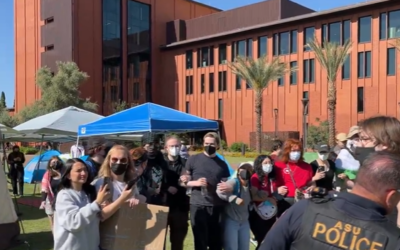By Corinne Murdock |
Phoenix officers and residents have expressed concerns that the Department of Justice (DOJ) will use a consent decree to take over the Phoenix Police Department (PPD), as they have done for several dozen other major cities across the country.
Activists accused the DOJ of using a rinse-and-repeat playbook: launching opaque investigations into police departments over alleged misconduct that invariably churn out multimillion-dollar consent decrees containing politicized departmental reforms that result in higher crime rates.
Arizona Women of Action (AZWOA), a right-leaning grassroots nonprofit, said they have received emails from police officers expressing concern over Phoenix entering into a consent decree. AZWOA urged their network to have the Phoenix City Council oppose a consent decree in a press release.
“Please VOTE NO to a DOJ consent decree, and protect our city from high crime and high costs that come with it,” stated AZWOA. “Simply issue a letter of acknowledgement instead of taking on the costly and unnecessary Federal Monitor and decree.”
Consent decrees came to be during former President Bill Clinton’s first term in office under the Violent Crime Control and Law Enforcement Act of 1994, with the specific goal of remedying alleged civil rights violations based on alleged patterns or practices of racial discrimination or excessive use of force. Under a consent decree, a city agrees to federal reforms and monitoring outlined as Recommended Remedial Measures (RRM) within a court-enforced settlement agreed upon by the city and DOJ. Should a city refuse an agreement, the DOJ will then sue the city to ensure compliance.
The DOJ began investigating PPD in August 2021. Their investigation focuses on types of force used, retaliatory activity against First Amendment-protected activity, discriminatory policing, unlawful seizures or disposals of homeless belongings, and responses to disabled individuals.
In August, two years after initiating their investigation, the DOJ and city of Phoenix offered an update. PPD provided over 20,000 body-worn camera videos, 80,000 documents, 200 hours of ride-alongs, and access to trainings at Phoenix Police Academy to DOJ investigators. PPD Interim Chief Michael Sullivan indicated in a video corresponding with the two-year update that PPD would seek to be independent of DOJ oversight.
“We need to be a self-assessing, self-correcting agency, and that’s not just something that we say,” said Sullivan.
Albuquerque, New Mexico; Baltimore, Maryland; Chicago, Illinois; Cleveland, Ohio; Ferguson, Missouri; Los Angeles County, California; Miami, Florida; New Orleans, Louisiana; Newark, New Jersey; Portland, Oregon; the Puerto Rico Police Department; Seattle, Washington; Springfield, Massachusetts; and Suffolk County, New York are among those major cities who have operated under a DOJ consent decree.
These consent decrees come at a great cost, with cities paying anywhere from several to tens of millions annually. Cleveland taxpayers have paid anywhere from $6 million to $11 million annually since 2015.
Part of the great cost comes from independent monitors charged with ensuring law enforcement’s compliance with the consent decree. Albuquerque has paid out millions to its independent monitor: six figures a month, totaling about $11 million since his work began in 2015. The monitor has made over $1.5 million annually, despite reportedly not living in the city. What’s more, investigative reporters found in April that Albuquerque’s violent crime rate has doubled since DOJ oversight began in 2015. Albuquerque Police Officers Association president Shaun Willoughby said that DOJ oversight has cost much for worsening returns.
“We have spent millions upon millions upon millions of taxpayers’ dollars, for what?” said Willoughby. “What did you get, Albuquerque? What did you receive out of this process but higher crime, a smaller police department, and you’re waiting longer for calls? That’s it.”
Consent decree timelines are subject to change as well.
Despite the worsening crime conditions, Albuquerque may only leave the consent decree if it achieves 95 percent operational compliance; as of May, the city had achieved 92 percent. The city originally agreed in 2015 to attempt full compliance within four years, or 2019, but has been kept under the agreement for over eight years now.
Studies have linked consent decrees to excess crime. A 2020 Harvard University report claimed that consent decrees created the conditions for 900 excess homicides and nearly 34,000 excess felonies.
Axios found that seven of 12 agencies experienced jumps in violent crime rates within the two years after enacting a consent decree.
Earlier this month, Law Officer reported that the city of Phoenix posted a job opening for a DOJ policy writer — despite the DOJ not having yet completed its investigation. The job listing appears to have since been removed.
“We aren’t sure what is happening in Phoenix but the DOJ has not even completed an investigation and it appears that officials within the city are simply assuming that they will be under a DOJ Consent Decree?” questioned the report.
Corinne Murdock is a reporter for AZ Free News. Follow her latest on Twitter, or email tips to corinne@azfreenews.com.








